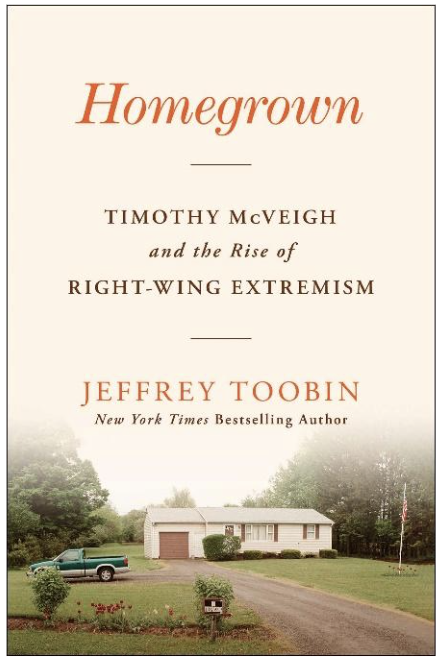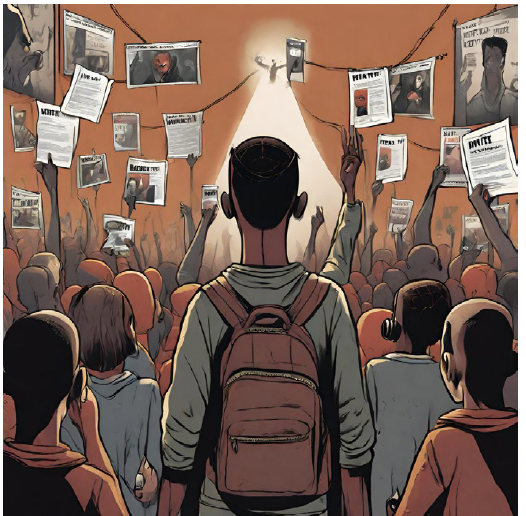Consider the rise of anti-government activism and the role of media and technology in extremist violence of the past, present, and future.
 There’s never been a more important time to read and discuss Homegrown by Jeffrey Toobin. Violence and threats of violence have become commonplace in American public life. Targeted violence and anti-government activism are on the rise, and a growing number of citizens across America now believe violence is needed to address the grievances that are polarizing society.
There’s never been a more important time to read and discuss Homegrown by Jeffrey Toobin. Violence and threats of violence have become commonplace in American public life. Targeted violence and anti-government activism are on the rise, and a growing number of citizens across America now believe violence is needed to address the grievances that are polarizing society.
Click here to access the PDF Study Guide
 Violent extremism is not limited to any one political ideology or party in the United States. Extremist ideologies and acts of violence are associated with various political, ideological, and religious beliefs, and they can emerge from both the right and left ends of the political spectrum.
Violent extremism is not limited to any one political ideology or party in the United States. Extremist ideologies and acts of violence are associated with various political, ideological, and religious beliefs, and they can emerge from both the right and left ends of the political spectrum.
There have been instances of violent extremism associated with right-wing ideologies, such as white supremacism, anti-government extremism, and militia movements. A New York Times news story reported that at an Idaho political rally in 2021, a young man stepped up to a microphone to ask when he could start killing Democrats. “How many elections are they going to steal before we kill these people?” The local state representative, a Republican, later called it a “fair” question.
While much less prevalent, extremist violence has been associated with left-wing ideologies. Individuals seeking to achieve political or social change have used violent intimidation to challenge those with whom they disagree. For example, in March 2023, hundreds of anti-police activists breached the site of a proposed new police and fire training center in Atlanta, Georgia. They burned construction vehicles and threw rocks, bricks, and Molotov cocktails at police.
Most Americans reject violence. The vast majority of Americans, regardless of their political beliefs, engage in peaceful political discourse and activism. They do not believe that violence is a viable means to achieve political goals. Addressing the issue of violent extremism in the United States requires a comprehensive and nonpartisan approach that focuses on promoting tolerance, understanding, and the rule of law while safeguarding freedom of speech and peaceful political expression.
SOME KEY THEMES
Readers of Homegrown by Jeffrey Toobin will find many parallels between the story of the 1995 Oklahoma City bombing and the rise of anti-government extremism revealed in the January 6, 2021, insurrection. You can use the study guide to can explore six themes in the book. Start by reviewing selected quotes from the book and then discuss some questions, as in the example shown below.
● Patriots Who Love Their Country But Detest Everything About It
● A Community of Freedom Lovers
● How Media Amplifies Extremist Voices
● Dog Whistles for Revolutionaries
● How Politicians Exploit Grievances
● Violent Extremists in the Military

Patriots Who Love Their Country But Detest Everything About It
Readers learn about why Timothy McVeigh was inspired to take violent action and how he considered the ideology of violent extremism as a type of patriotism.
There were, then, three powerful ideological motivations for McVeigh’s decision to bomb the Murrah building: the obsession with gun rights; the perceived approval of the Founding Fathers; and the belief in the value and power of violence. These feelings were replicated, with extraordinary precision, in the rioters on January 6 as well as many of the other right-wing extremists who have flourished in the quarter century since the bombing. (Toobin, p. 6)
There was a paradox in McVeigh’s patriotism, just as there is among his ideological successors. They profess to love their country, but detest nearly everything about the contemporary United States. For McVeigh, Ruby Ridge, Waco, Clinton, and guns were just the start. (Toobin, p. 6)
There is, in McVeigh’s absence of planning for a next act, a similarity to the attitudes of many rioters in the Capitol on January 6, 2021. Rather, to the extent the rioters could articulate it, the mission—the fight—was the end in itself. (Toobin, pp. 127–128)
According to an Economist/YouGov poll in the summer of 2022, 43 percent of Americans believe it’s at least somewhat “likely” that “there will be a U.S. civil war within the next decade.” More than half of Republicans feel that way, and 21 percent of “strong Republicans” believe a civil war is “very likely.” McVeigh’s extremism had spread to much of the contemporary Republican Party. (Toobin, pp. 317–318)
For Discussion:
What do you love most about your country?
What deeply troubles you about your country? What do you do about the things that trouble you?
Was the purpose of the January 6 insurrection primarily a symbolic act of protest?
What are some examples of acts of protest that were not violent?
Do you think a future civil war is likely? Why or why not?
GUIDELINES FOR COURAGEOUS CONVERSATIONS
Book club discussions bring together groups of people who often have very different expectations. Some people aim to keep the conversation focused on the book, while others use the topic of the book as a vehicle for social interaction and sharing. Everyone will have an opinion on the topic of violent extremism in the United States. Whichever way you focus your group’s attention, it will be wise to set the stage for a Courageous Conversation by beginning your book club discussion with these guidelines:
- Speak for yourself and out of your own experience while recognizing that your words have an impact.
- Be respectful. Allow others to do the same.
- Share the time—allow others to finish speaking; take turns. Consider waiting for others to contribute before speaking a second or third time.
- Stay curious—ask honest questions when you need clarification.
- Pause—take time for reflection. Allow for silence.
- Practice active listening and listen for understanding. Assume good intentions, and notice what feelings arise in you when others are speaking.
- When possible, please close any unnecessary programs, applications, and notifications, and put your phone on silent so you can be fully present.
PREFERRED CITATION: Morgan, C. & Hobbs, R. (2024). Homegrown: A Study Guide. Media Education Lab.